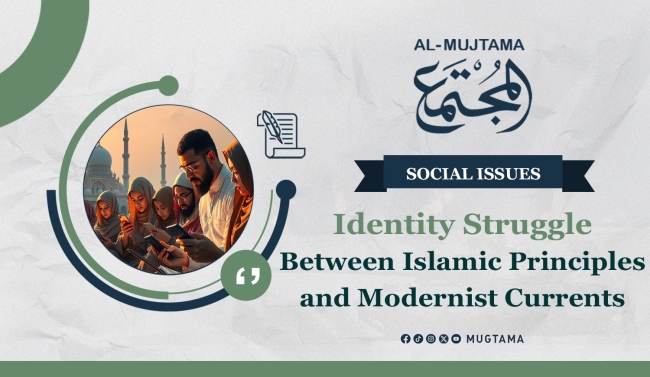Identity Struggle Between Islamic Principles and Modernist Currents
Amid the shifting values in Muslim societies, a young man stands at the threshold of adulthood. He was born and raised in a home that revered Islamic principles, knowing that manhood is a responsibility and that guardianship is a duty, not a privilege. Yet today, he lives in an era where these concepts have become mere passing debates. He hears claims that absolute equality between men and women is the only path to justice and that guardianship is nothing more than a remnant of an outdated patriarchal culture. As he looks around, he sees young men like him who no longer view themselves as leaders but have instead become spectators in a society that changes without them, torn between holding on to their roots or drifting with the tide.
In another scene, in a home that was once filled with warm family values, a mother sits, exhausted by life's pressures. She juggles a job she never saw as necessary and the increasingly difficult task of raising children in the shadow of overwhelming screens and external influences. She knew that motherhood was a noble role and that the family was the fortress of society. But now, she finds herself confronted with voices telling her that sacrificing for the family is weakness and that true success lies in complete independence from traditional responsibilities. As she looks at her children, she wonders: Do they need a mother, or a new model that aligns with the demands of the age?
Elsewhere, in a media landscape that once nurtured awareness and protected identity, the scene has changed. Programs now promote moral laxity under the guise of liberation, sitcoms mock traditional values in the name of comedy, and advertisements impose new standards of beauty and social status. Where Muslim societies once shielded themselves from such ideological invasions, today they consume them unresistingly, even welcoming them into their homes without recognizing the consequences.
Were these changes natural? Or is there something deeper at play?
In an even broader scene, in the arenas of intellectual discourse, voices clash. Some argue that value transformations are an inevitable requirement of modernity, while others warn against losing identity under the pressures of Westernization. Amidst them, there are silent observers who witness the scene with sorrow. They understand that change may be necessary but also recognize the distinction between progress and self-erasure. They clearly see the difference between embracing the natural course of life and abandoning the very foundations upon which Muslim societies are built.
And here, the great question arises: Can matters be restored to their rightful balance? Can a harmony be achieved between modernity and identity? Are there still voices in the Ummah willing to declare: We are a nation with our own values, principles, and distinctiveness that must not dissolve into Western currents? The words of Allah resonate: "Then is it the judgment of ignorance they desire? But who is better than Allah in judgment for a people who are certain [in faith]." (Al-Ma'idah: 50)
The answer begins when each individual in this society decides to redefine their identity—not as others dictate, but as their faith, history, and natural disposition dictate. Islam is preserved by Allah’s promise, and human nature cannot be erased no matter how strong the tides of Westernization grow. This Ummah has endured many trials, yet it always emerges stronger because there are always those who hold fast to the truth. The Prophet ﷺ said: "A group of my Ummah will continue to prevail upon the truth. Those who abandon them or oppose them shall not harm them until Allah’s decree arrives while they remain as such." (Sahih Muslim)
Moreover, balancing modernity and identity does not mean melting into the West but rather building a comprehensive civilizational model rooted in Islamic values rather than dry materialism. The Muslim must harness ideas to create a revival firmly anchored in our principles, just as the early Muslims did when they combined knowledge with faith and progress with identity. Allah says: "You are the best nation produced [as an example] for mankind. You enjoin what is right and forbid what is wrong and believe in Allah." (Aal 'Imran: 110)
The voices of those who believe in the truth have never and will never disappear, no matter how much the media tries to suppress them. Awareness is growing, and revival is renewing itself. We have seen Muslim communities in the West resisting dilution campaigns and families rediscovering Islam’s role in building society. All of this is proof that Islam is stronger than any attempt to dissolve it and that human nature will always seek and return to the truth, no matter how far it strays.
-------------------------------------------------------------


